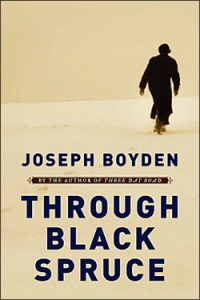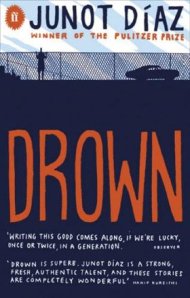 I had read Joseph Boyden’s Through Black Spruce a few years ago and really enjoyed it. I re-read it last week as part of some final adjustments to my dissertation. I’m glad I had the chance to re-acquaint myself with Boyden’s work because it is sometimes easy to get carried away with criticizing authors for things extraneous to their writing. I don’t think I will be reading his latest book, The Orenda, any time soon, and I’m still not necessarily on-board with the way he has become a “celebrity” Native author (for a review from a friend of Boyden’s latest novel see here). However, Through Black Spruce is a genuinely good read. I think I was paying more attention to form and style this time around and I was happily rewarded with an intricate narrative structure and a compelling narrative.
I had read Joseph Boyden’s Through Black Spruce a few years ago and really enjoyed it. I re-read it last week as part of some final adjustments to my dissertation. I’m glad I had the chance to re-acquaint myself with Boyden’s work because it is sometimes easy to get carried away with criticizing authors for things extraneous to their writing. I don’t think I will be reading his latest book, The Orenda, any time soon, and I’m still not necessarily on-board with the way he has become a “celebrity” Native author (for a review from a friend of Boyden’s latest novel see here). However, Through Black Spruce is a genuinely good read. I think I was paying more attention to form and style this time around and I was happily rewarded with an intricate narrative structure and a compelling narrative.
The novel centres on two protagonists – Will Bird, an alcoholic Cree bush pilot, and his niece Annie, both of whom live in Moose Factory/Moosonee – who are attempting to put their lives back together in the wake of drug-related violence. Annie’s sister Suzanne has gone missing with Gus Netmaker, the brother of Marius Netmaker who violently attacks Will because he believes that Will has been talking to the police about his drug dealing. You can already get a sense of how intertwined these two narratives are. The novel moves back and forth between Will’s narration and Annie’s. The catch is that for the most part, Will is in a coma after another vicious attack by Marius, while Annie begins to narrate her search for Suzanne while she is visiting Will in the hospital. At first glance this seems like an odd narrative structure, but this time around I really appreciated what it made possible in terms of story-telling. Boyden also does a good job using suspense to keep readers pushing along as he begins to weave the two seemingly separate narratives together by the story’s end.
What Through Black Spruce does quite well is represent the difficult reality that many northern indigenous communities face as drugs make their way north, ruining the communities by poisoning the youth. However, Boyden refuses to let tragedy rule and instead weaves a narrative of resilience and courage even as he remains true to the brokenness of his community. Like Richard Wagamese’s Indian Horse, this novel performs a kind of literary healing for its indigenous characters. This is not to say that it makes everything right in the real world, but it does open up a space to think and talk about the serious issues that many of Canada’s indigenous communities face.
For me, this is Boyden’s best work as I found Three Day Road too violent for my liking and I’m not sure I’ll pick up The Orenda based on some of the reviews/criticism it has attracted. I think his early collection of short stories, Born With a Tooth, was quite good, but Through Black Spruce presents Boyden at his best.
I recommend Through Black Spruce for fans of indigenous writing and those who like narratives set in Canada’s north.
Boyden, Joseph. Through Black Spruce. Toronto: Penguin Canada, 2009. Print.
